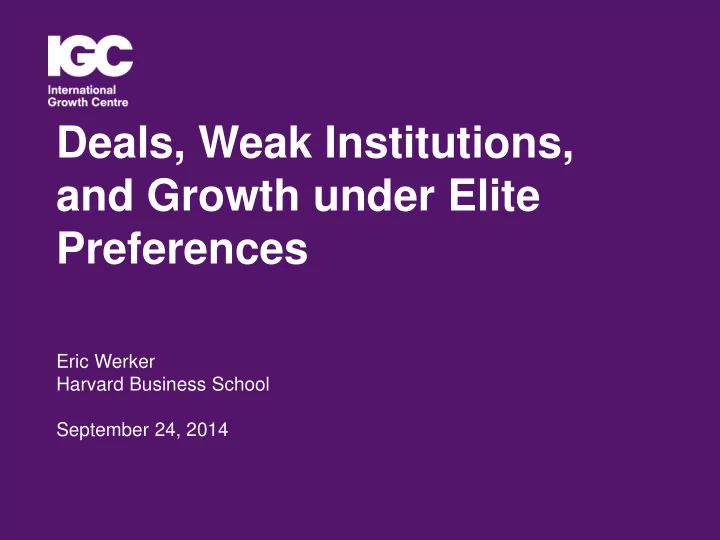

Deals, Weak Institutions, and Growth under Elite Preferences Eric Werker Harvard Business School September 24, 2014
Doing Business e.g. ROC, ranked 185/189 • Paying taxes: 49 payments per year, 602 hours • Exporting: 11 documents, 50 days • Importing: 10 documents, 54 days • Enforcing contracts: 44 procedures, 560 days How is this stable and “optimal”? 2 Source: www.doingbusiness.org
Deals vs. Rules 3 Source: Hallward-Driemeier and Pritchett 2011, in Pritchett and Werker 2012
Categorizing Economic Interests Market Discretionary Competition Rents MAGICIANS RENTIERS Export- Manufacturing, service, Mining, oil and gas Oriented agricultural exports WORKHORSES POWERBROKERS Domestic Small-scale farmers, light Power generation and Market manufacturing, distribution, ports, natural restaurants, retailers monopolies Source: Pritchett and Werker 2012 4
Mapping Economic Interests Export - oriented - Magicians Rentiers Competitive High – rent Workhorses Powerbrokers Domestic market Source: Werker 2012 5
It’s a Deals World Aggregation of preferences • Protecting the powerbrokers • Rentiers are ring-fenced • Workhorses informal, checked out • No magicians to speak of Accountability • Buying flexibility not reforms • Deals not rules A burst in growth may entrench elite interests, sending institutions backwards 6
The East Asian Tigers, rules, and transitions Export - oriented Magicians Rentiers Competitive High – rent Workhorses Powerbrokers Domestic market 7
International Growth Centre London School of Economics and Political Science Houghton Street London WC2 2AE www.theigc.org
Recommend
More recommend